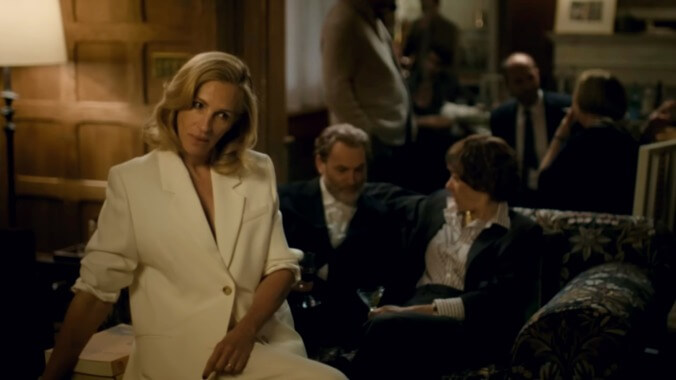Julia Roberts Is Great, But Cate Blanchett Is Still My Cancel Culture Queen
After The Hunt is right about cancel culture, but it's certainly no Tár.
Photo: Screenshot
Somewhere in the press cycle for Luca Guadagnino’s After The Hunt, I got antsy about what the film would suggest about cancel culture, the stagnancy of the #MeToo movement, and survivor justice. If I had to pinpoint when the nerves set in, perhaps it was after I learned that the Oscar-nominated filmmaker used Woody Allen’s Windsor typeface in its opening credits. Or maybe when its star, Julia Roberts, got defensive about the film’s revival of, as one journalist put it, “old arguments” about believing women. That said, I am relieved to report that After The Hunt‘s bottom line is actually quite right. Spoiler alert: Cancel culture doesn’t actually exist. Nor does “accountability culture,” or any culture in which the people who most deserve cruel consequences actually receive them. Arriving at that conclusion, however, isn’t worth the vexation.
At the center of Nora Garett’s story is Alma Imhoff (played with stellar steeliness by Roberts), a renowned philosophy professor at Yale. From her ripped-from-the-pages-of-Architecture Digest home right down to her Loewe loafers, you immediately glean a certain girlboss-ery that invites easy admirers and even easier adversaries. She champions women—or so we’re told until her favorite student, Maggie Price (Ayo Edebiri, who is sadly no match for Roberts), claims that Imhoff’s colleague and friend, Hank Gibson (Andrew Garfield), sexually assaulted her after the pair left a gathering at her home.
If you’re hoping to see elitist academics get a morality lesson, you won’t. Instead, unfortunately, you get the notion that all of the characters at fault will be just fine—namely, because if there’s any trap that ensnares Americans more than watching the retribution of powerful people, it’s their subsequent PR rehabilitation and redemption arcs. As we’ve witnessed in real time, a well-written op-ed, some absence from the spotlight, or simply loudly refuting even the most well-documented truth is enough to maintain social and financial capital. That knowledge—that one can simply flout fact—is now a more formidable weapon than any other. The three characters at the center of the film’s conflict boast well-equipped arsenals.
Like what you just read? You’ve got great taste. Subscribe to Jezebel, and for $5 a month or $50 a year, you’ll get access to a bunch of subscriber benefits, including getting to read the next article (and all the ones after that) ad-free. Plus, you’ll be supporting independent journalism—which, can you even imagine not supporting independent journalism in times like these? Yikes.
-

-

-

-

-

-

-

-

-

-

-

-

-

-

-

-

-

-

-

-

-

-

-

-

-

-

-

-

-

-

-

-

-

-

-

-

-

-

-

-








































